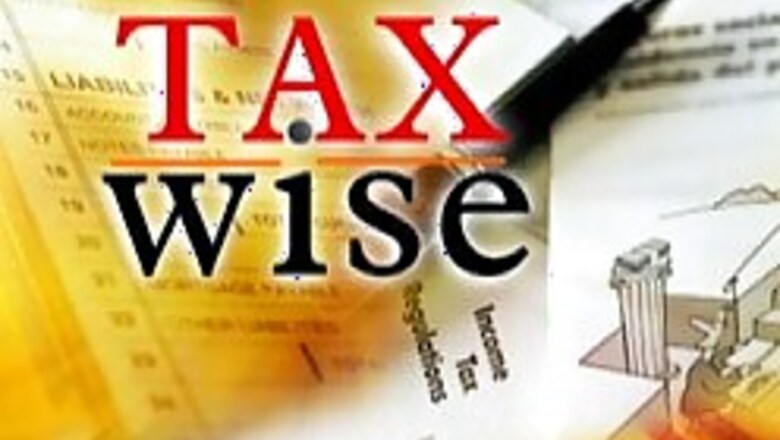
views
Tax expert, Subhash Lakhotia tells you how to sail through your taxing queries on CNN IBN's special series on investment solutions and advice.
Query: I am Gurtek Singh Kannu working as a Senior officer in private company. I am keen on investing. Should I start investing now (in the months of August – September) or should I wait till next year?
Ans: In younger times you must have studied in school,"early to bed and early to rise makes you healthy, wealthy and wise." The same applies to investment as well.
The earlier you start investing; better would be the returns in the long run. If you invest today, you get more time to liquidate this money, which will mature in five years in case of bank fixed deposits and in three years in case of Equity Linked Structures Funds.
Tip:To get the full benefit of the various deductions and exemptions one needs to start early investing. The earlier you invest the more would be the benefits you reap.
Query: Aren't most investments based on 'income of the year'? What does this term means?
Ans: The provisions of the tax laws have been completely changed in the past two years. The time when investments were supposed to be made from the 'income of the year' is a thing of the past.
Investments can be made (with the view of getting tax benefits) out of the income of the year or even from the non-income of the year, it hardly makes any difference. So do not worry and start investing right now.
Query: Does it make any difference if one is married or if there is a change in the income level?
Ans: No, it does not makes any difference whether you are married or unmarried, same level of tax benefits are available to all categories of tax payers.
PAGE_BREAK
Tip: So, marriage may have other perks but saving tax through deductions is not one of them!
Lets us divide our queries into different slabs:
Query: Our first tax payer is called ‘Mr ten per cent’ who is under 65 years of age and earns an income between Rs 1 -1.5 lakh p a. This attracts a tax rate of 10 per cent. What kind of tax saving investments should he make?
Ans: He should make investments maximum up to Rs 50,000 in a year so that his tax liability come to a zero.
The best recommendation from the point of view of section 80 C would be:
- Life Insurance premium; (a need plus a tax benefit)
- National Saving Certificate and National Saving Scheme
- Bank Fixed deposits
Query: Why are you advising to invest in National Saving Schemes and Certificates and Bank Fixed Deposits though income from these is also taxable?
Ans: True. It does attract tax but this gentleman is falling under the income bracket where the total tax is only ten per cent. It makes sense to invest in NSC, NSS and Bank FDs because in these areas the tax impact would be minimum.
Tip You should invest in Life Insurance premium; National Saving Certificates and Schemes and bank fixed deposits. Don't worry about attracting tax since it’s at the minimal rate!
PAGE_BREAK
Query: Next category is Mr 20 per cent; who is under 60 years of age, earns between Rs 1.5 -2.5 lakhs and is taxed at 20 per cent. What’s your advise to him?
Ans: We recommend that he should (under section 80 c ) claim deduction by investing in:
- life Insurance Policies
- ELSS Equity Linked Savings Schemes
- Pubic Provident Funds
- Tuition fee on children's education
- Repayment of the principal of the housing loan
In addition to these one can also claim deduction to the tune of 1.5 lakh for the Interest paid on the housing loan.
Query: Very well said. But here for Mr 20 per cent you have dropped the recommendation of national savings certificates and schemes and the Bank FDs. Why so?
Ans: I have deliberately omitted the NSC, Bank FD and NSS from this category because income from these sources is now taxed at 20 per cent.
People falling in this category should avoid investing in Bank FDR, NSC and NSS because whatever interest would be earned from them would directly come under the tax liability of 20 per cent. Hence it is better to invest the same amount in the other instruments.
Query: What is the benefit of Equity Linked Savings Schemes?
Ans: The Equity Linked Saving Schemes have huge benefit attached to it. The income from Equity Linked Saving Schemes is completely free from all tax liabilities.
Query: So where does one go to invest in the Equity Linked Saving Schemes?
Ans: You don’t need to go any where. Almost all Mutual Fund schemes have ELSS schemes available. Actually these are mutual funds issued by different Mutual Fund organisations specifically de-marketed and known as ‘tax-savers’. They come under the limit of Equity Linked Saving Schemes.
Query: You also mentioned tuition fee; are you including all the money spent on a child's education?
Ans: Not at all. It only includes direct tuition/ college fee. It will not take care of other expenditures incurred on children’s education. Books, school bus and private tuition will not be covered.
PAGE_BREAK
Query: Mr Lakhotia you've mentioned housing loan twice- why is this?
Ans: Housing loan is best recommended tax planning for all tax payers. When you buy residential house property not with your own money but on loan, it gives you two big advantages.
Firstly, those who are taking a housing loan no matter from what source it has been taken, you get a deduction from the income tax in respect of the loan interest, to the extent of Rs 1,50, 000 per annum.
Query: There are so many components that we talked about, how does one allocate and divide?
Ans: Best would be to allocate and decide on the theme of Personal Financial Planner. Divide all your investments, which are eligible for tax deduction under section 80C, group them under three to five categories and allocate the money.
In case you are not in need of money for the next three years, best would be to invest in ELSS or invest major portion in PPF (Personal Provident Fund) up to Rs 70, 000, which would be absolutely tax free. No income tax is payable on the interest income earned from PPF.
Query: Lets’ take into consideration the highest income group which has a tax liability of over thirty per cent. What are your advices (irrespective of the gender or age) to people who are earning more than Rs 20, 5000 per annum?
Ans: Both husband and wife falling in the category of thirty per cent tax liability can enjoy tax benefit if they invest in a residential property jointly, take a housing loan.
PAGE_BREAK
Not just you gain in terms of asset value, also it gives you the tax deduction on loan repayment.
This tax deduction is available up to Rs 1, 50,000 on repayment of interest on the loan, coupled with section 80 C investments. I would also recommend this category of taxpayers that they invest Rs 1 lakh in:
- Equity Linked Savings Schemes ELSS
- Public Provident Fund
- Repayment of housing loan
- Life Insurance
Query: You have again dropped the Fixed Deposits. These are very safe means of investments, so why exclude them?
Ans: ‘Safe investment’ is just one aspect of investing. You also have to consider options, which ensure ‘tax wise safety’.
Supposing if I were to invest in Bank Fixed Deposits, it would give me utmost safety. But the income that I would gain from these deposits would be taxable. Almost 30 per cent of the income gained from Fixed Deposits will have to be paid in terms of tax.
But remember, in case of PPF, at the same interest (8 per cent) the income earned would be the same and that too completely free from tax liability.
Women and taxes; what’s different?
PAGE_BREAK
Query: Lets talk about women and taxes. How is the situation different for them?
Ans: When it comes to tax deductions there are no different provisions for women. The only difference is with regard to the initial tax exemption income. For women the exemption limit is Rs 1.35 lakhs. And for women who are in the senior citizen category, the exemption limit is 1.85 lakhs.
Rest of the tax-slabs are usual and so the investment prescription too remains the same.
Query: Don’t women get any relief for investing in jewellery?
Ans: No.
Tip: Women don’t get anything except for a higher deduction limit. The rest stays the same. So, you can love your gems, but don’t expect any tax breaks on them!
Query: Now lets focus on senior citizens; that is anyone over 60 years of age? What special provisions are there for them?
Ans: Firstly, senior citizen enjoy zero income tax on income up to Rs 1.85 lakh.
PAGE_BREAK
Also senior citizen enjoy deduction under section 80 D, up to Rs 15,000, in respect to medi-claim policies, whereas the normal citizens get tax deduction only up to Rs 10,000.
Query: Many senior citizens are likely to have life insurance ? You're talking about additional insurance. How does that work?
Ans: Senior citizen can invest in insurance policies in respect to their son’s or daughter’s to enjoy the tax benefit.
Query: But what if the son or daughter is already married?
Ans: Marriage will not affect anything in this regard.
Query: If my income is over Rs 8 lakhs pa, will I get any tax benefits from my investments?
Ans: You fall under the highest tax bracket. To save Rs 30,000 of income tax you will have to invest at least Rs 1 lakh. And if you want to save further, take a house loan and buy a residential property on which you will get maximum tax benefit in terms of interest on loan.
Query: My wife and I have applied for a joint housing loan, will both of us get benefits from that loan?
Ans: Yes indeed. Your wife and you both will get to enjoy separate tax deductions, even though the property owned by you is common.
Query:My wife has no income of her own, can I save tax by investing in her name?
Ans: You can invest in life insurance policies and also PPF in your wife’s name to enjoy tax benefits. However, the total limit of these investments would be Rs 1 lakh.
Query: Mr Lakhotia could you tell about the most common mistakes people make while investing? How should they be avoided?
Ans: There are many common mistakes that people make. Number one common mistake is while filing separate income tax for the spouse. People show the income received from a ‘gift to spouse’ in the wife’s income tax file.
PAGE_BREAK
Always remember that a married lady who is filing income tax separately cannot show gifts from:
a) Husband
b) Father in-law
c) Mother in-law
Other than these three taxpayers, a married lady can receive gifts and show them in a separate income tax file.
Second most common mistake is when taxpayers do not declare their income from bank interest. Until last year there was a section (80L), which allowed exemption of Rs 12,000 by way of bank interest. However, from this year onwards, the Government has taken away this deduction, making the bank interest income fully taxable.
So, taxpayers please do declare all of your bank interest income while filing income tax return.
Query: Finally, could you sum up the three income slabs and tax deductions applying to them?
Ans: The three slabs are:
Lower Income Slab (The ten percent tax slab)
When you are in the lowest bracket (10 per cent ) just make sure that your total investment is up to such an extent that your net taxable income comes within the limit of Rs 1 lakh so that the tax payable by you becomes zero.
Invest in:
- Life Insurance
- NSC and NSS
- Bank FDs
Middle Income Slab (Twenty per cent slab): When you are in the twenty per cent tax bracket, you should invest in such in vistas where the income is as far as possible tax-free.
We recommend:
- Life Insurance
- ELSS
- PPF
- Tuition fee
Interest from PPF is completely tax-free. Amount received back from insurance companies is also tax-free.
Higher Income Slab (Thirty per cent tax slab): Invest in such options which give you a return as well as the tax exemption benefit.
The amount that you get at the time of maturity of Insurance policy is tax-free. Also if you plan well, ELSS can also prove a profitable investment. Dividend income received y-o-y from ELSS is also tax-free.
We recommend:
- Life Insurance
- ELSS
- PPF
- Tuition fee
Scenario for Women
- Tax exemption upto Rs 1.35 lakh.
- Investment strategy unaltered
Scenario for Senior Citizen: I would suggest Senior Citizen to gist their assets to their major children and get the tax benefit. The income they derive from these assets will not be added to your income.

















Comments
0 comment